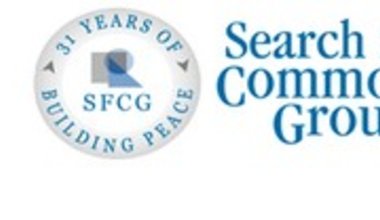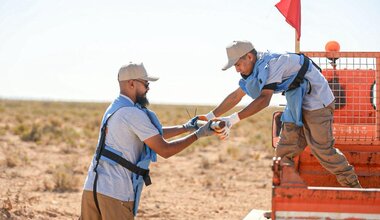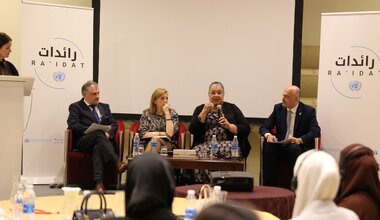Workshop to Facilitate Dialogue between Media and Security Sector in Libya
23 April, Tripoli - UNESCO, UNSMIL and the nongovernmental organization Search for Common Ground organized the second of two workshops to facilitate dialogue between Libyan media professionals and officials of the Libyan Ministries of Defense, Interior, Justice, and Information as well as members of the General National Congress.
A two-day workshop targeting 15 public and private broadcasters, print and online journalists and an equal number of government officials was held 20-21 April at the Haroon Hotel in Tripoli, as a follow-up to the first session held on 23-24 February.
“It is crucial to spark dialogue in Libya between the media and the security sector,” said Ismail Ould Cheikh Ahmed, Deputy Special Representative of the UN Secretary-General in Libya, during welcoming remarks. “Each depends on the other to better serve the public, and we are hopeful that this workshop will lead to increased cooperation between the two, so as to protect freedom of expression and reinforce Libyan democracy.”
A team of experts from Search for Common Ground, with experience in using dialogue to address conflict in the Middle East and North African region facilitated the workshops, with support from specialized trainers from the Tunisian Ministry of Interior Affairs.
Topics addressed in the workshop included: sharing the Tunisian experience of training for freedom of expression within the security sector; common threats and challenges faced by media and security forces; and opportunities for future collaboration and reform in both sectors.
“We are just here to facilitate,” explained Abou El Mahassine Fassi-Fihri, Regional Director for Search for Common Ground, at the beginning of the workshop. “Your own discussions and exchange of views will result in a starting point for further dialogue between your respective sectors.”
The programme aimed to foster a safer operating environment for media and facilitate public debate on freedom of expression and on the role of media practitioners and raise awareness among security and justice officials of these issues. Taking place in an environment affected by an increasing number of attacks on the media, it is part of an ongoing capacity-building programme of support for the Libyan government and media funded by the governments of Sweden and Finland.
“Both media and the security and justice sectors have important roles to play in the development of the Libyan state,” said Jessica Hjarrand, UNESCO Programme Specialist, in her introductory remarks. “What we are seeking to support is the development of understanding between the two, and an increased awareness both individually and collectively about your different professional roles.”
The need to maintain such dialogue is particularly pressing in Libya, where decades of authoritarian control and censorship have prevented media practitioners from developing the professional competencies they need. Likewise, security officials need to develop their skills in working with the media in the interest of transparency and accountability, and both media and security forces face widespread public misperceptions and mistrust.
For more information, please contact:
UNESCO Project Office in Libya:
Ms. Jessica Hjarrand,
Programme Specialist
+218 (0)91 150 6339
j.hjarrand@unesco.org
UNSMIL Public Information Office:
Mr. Samir Ghattas
Chief, Public Information and Communications Office, a.i.
+218 (0) 91 222 0086
ghattass@un.org

 United Nations Peacekeeping
United Nations Peacekeeping UN
UN









